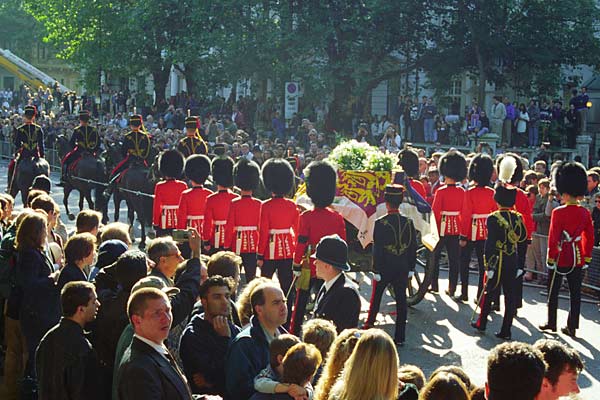On the evening of August 31, 1997, my mother tucked me into bed, turned off my bedside lamp and kissed me goodnight. She settled in front of the television in my parents' room, and just as I began to nod off, I heard her gasp. I leapt out of bed, and ran to her to see if she was all right. Her eyes were glued to the television, and after ascertaining that she was safe, I shifted my focus to MSNBC. The lower third read, "BREAKING NEWS: PRINCESS DIANA SERIOUSLY INJURED IN CAR CRASH, TWO DEAD". Although I couldn't fully comprehend the gravity of the situation, my stomach dropped. I was capable of gathering from the initial report that this breathtakingly beautiful, altruistic icon was in danger. My mother and I were transfixed to the screen all night as we received continuous updates from a rotating assemblage of reporters, listing her condition as serious, critical, then grave. At midnight, citing Sky News, we learned that it was likely that Princess Diana had died from her injuries.

Wreckage of the Mercedes-Benz S280 W140, which carried Princess Diana, companion Dodi Fayed and driver Henri Paul on the night of August 31.
As a ten year old, death was still a nebulous concept. In hindsight, the somber reporting throughout the evening served as my emotional compass. When a correspondent would report that the princess was still alive, a flutter of hope rose in my chest and a wave of relief would wash over me. Later in the evening, British journalists relayed the latest inauspicious updates, and in turn, I feared the worst. I contemplated the miniscule possibility that anyone could possibly escape the flattened, razed shell of the Mercedes limousine before my eyes.
The subsequent tabloid coverage, combined with my nonexistent knowledge of the trademark sensationalism of these questionable sources sent me into a tailspin. In the following days I was inundated with misinformation at the checkout counter of our local grocery store. Tabloids had emblazoned insensitive photographs of the crash onto their covers, along with accusations of conspiracies, and slanderous headlines about Diana. Confused, I turned to my mother and father for verification of the reports, and they tried their best to imbue a healthy skepticism of these particular publications. Overwhelmed by the negativity of these heartless reports, (and partly based around my understanding of the tabloid media's role in the crash), I no longer wanted to view any coverage of the tragedy, regardless of the source.
Several days later, however, my parents and I gathered around the television to view Diana's funeral. I watched as the cameras panned through the gargantuan crowds, zooming in on the sobbing people who had hoped she'd pull through, just as I had hoped she would. My father later informed me that half the world was watching the same event on television at once, and as incomprehensible as it initially seemed, I found comfort in knowing that 2.5 billion people were, at least for a few hours, united by this tragedy, and that the media enabled us to grieve together.

A view of Princess Diana's funeral procession.
A series of news bulletins from the evening of the crash can be found here.
No comments:
Post a Comment